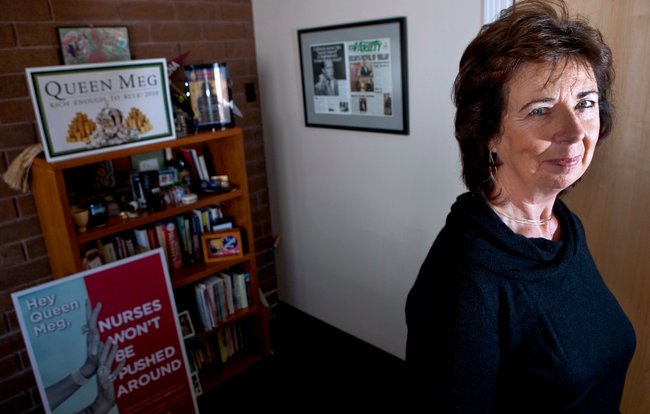News
Redefining the Union Boss

By: Ryan Anson/Bloomberg News
New York Times
November 20, 2011
Confronting Schwarzenegger
When Rose Ann DeMoro speaks, her voice sounds like a burbling faucet. Ms. DeMoro, 61, is executive director of National Nurses United, a 170,000-member union that she runs with dramatic flair.
Born in St. Louis, Ms. DeMoro married her high-school sweetheart, moved to California and raised two children. She left college to organize supermarket cashiers and was the first female organizer for the Western Conference of Teamsters. In 1986, she was offered a collective bargaining position at the California Nurses Association — though she had never been a nurse.
At the time, California had fewer registered nurses per patient than most any other state. Night-shift nurses in some hospitals cared for as many as 12 patients at a time, and some bedridden patients would actually dial “911” to seek help. In 2004, California passed a law requiring hospitals to have at least one nurse for every five patients. Arnold Schwarzenegger, then governor, delayed implementing part of that law, and at a conference nurses unfurled a protest banner during his speech. The governor told the crowd to pay no attention to special interests.
“I am always kicking their butts,” he said.
Ms. DeMoro pounced. She said the governor’s comment was “an affront to women everywhere.” Her union hounded the governor, going so far as to throw a New Orleans-style funeral in Sacramento for the concept of patient care.
After much back-and-forth, the law went into effect.
Greg Roth, a former manager in the California Department of Health Services, dealt with Ms. DeMoro during some contentious legislative hearings. He said she “is effective, but I didn’t feel as if the union showed appropriate respect for the process or for the rights of other people to be heard.”
In more recent years, Ms. DeMoro has helped organize local unions in Texas, Florida and elsewhere, joining forces with other nurse unions to create the national group.
“Rose Ann is not small fry,” said Mark Brenner, editor of Labor Notes, a nonprofit project that promotes unions through its magazine and Web site. “The nurses are more in sync with people than most any other group.”
Among other things, Ms. DeMoro has started a movement called “Heal America, Tax Wall Street.” Her union wants a 0.5 percent tax on stock trades and credit swaps, similar to those levied in 15 other countries. Such a tax might raise as much as $350 billion a year for health, education and jobs programs.
Critics are vocal, saying such a tax would discourage trading profits, but Ms. DeMoro dismisses them. “We pay sales taxes every day, and so should Wall Street,” she said.
To drive home that point, she and 1,000 red-shirted R.N.’s streamed onto Wall Street on June 22 to promote the tax and to protest what they saw as corporate welfare. Two months later, thousands of nurses visited 60 Congressional offices in 21 states, urging support for the Wall Street tax. The nurses also drew media attention by staging a mock news conference with a 10-foot tall puppet that looked a lot like Representative Michele Bachmann, the presidential candidate, and chasing adult-size chipmunks who lugged big acorns to their Wall Street “nests.”
The nurses’ approach has inspired Occupy Wall Street. “The nurses certainly set an example for us,” said Andy Pollack, a committee member of that group in Manhattan. Occupy Wall Street protesters have marched with other unions, “but the nurses go beyond their own contract issues and try to tackle the root of the problem,” he said.
Ms. DeMoro also recently led nurses from four continents to a Group of 20 meeting in Cannes, France, to lobby for a financial transactions tax in other nations as well.